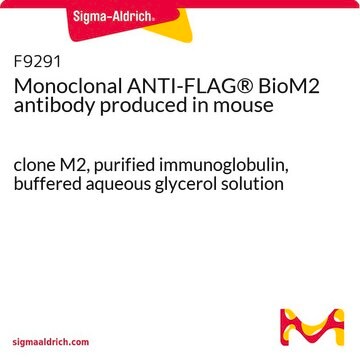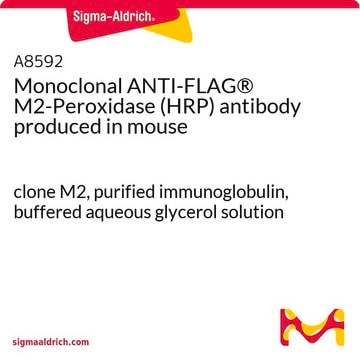B3111
ANTI-FLAG® M2 antibody, Mouse monoclonal
Clone M2, purified from hybridoma cell culture in bioreactor
Sinónimos:
Anti-ddddk, Anti-dykddddk, M2 clone ANTI-FLAG
Iniciar sesiónpara Ver la Fijación de precios por contrato y de la organización
About This Item
UNSPSC Code:
12352203
NACRES:
NA.43
Productos recomendados
biological source
mouse
antibody form
purified immunoglobulin (purified IgG1 subclass)
clone
M2, monoclonal
shelf life
4 yr
purified by
using Protein A
storage temp.
−20°C
General description
Monoclonal ANTI-FLAG M2 is a purified immunoglobulin, IgG1, monoclonal antibody, purified from culture supernatant of hybridoma cells, that binds to FLAG® fusion proteins. Unlike ANTI-FLAG M1 antibody, the M2 antibody will recognize the FLAG sequence at the N-terminus, Met-N-terminus, C-terminus, or at an internal site of FLAG fusion proteins. Monoclonal ANTI-FLAG M2 is useful for identification and capture of FLAG fusion proteins by common immunological procedures such as Western blots and immunoprecipitation. It is also useful for affinity purification of FLAG fusion proteins when bound to a solid support.
form: solution pH 7.4, containing 15 mM sodium azide
concentration: 3.0-5.0 mg/mL
form: solution pH 7.4, containing 15 mM sodium azide
concentration: 3.0-5.0 mg/mL
Application
IB, IF, IP, FACS, ELISA
Antibody is recommended for use in several applications such as immunoblotting, immunoprecipitation, immunofluorescence, flow cytometry, and ELISA.
Learn more product details in our FLAG® application portal.
Antibody is recommended for use in several applications such as immunoblotting, immunoprecipitation, immunofluorescence, flow cytometry, and ELISA.
Learn more product details in our FLAG® application portal.
Packaging
polypropylene screw cap vial
Preparation Note
Dilute the antibody solution from 0.5-10 ug/mL in specified buffer
Legal Information
ANTI-FLAG is a registered trademark of Merck KGaA, Darmstadt, Germany
FLAG is a registered trademark of Merck KGaA, Darmstadt, Germany
Storage Class
12 - Non Combustible Liquids
wgk_germany
nwg
flash_point_f
Not applicable
flash_point_c
Not applicable
Certificados de análisis (COA)
Busque Certificados de análisis (COA) introduciendo el número de lote del producto. Los números de lote se encuentran en la etiqueta del producto después de las palabras «Lot» o «Batch»
¿Ya tiene este producto?
Encuentre la documentación para los productos que ha comprado recientemente en la Biblioteca de documentos.
Arturo Roca-Rivada et al.
JCI insight, 9(9) (2024-05-08)
The importance of the proper localization of most receptors at the cell surface is often underestimated, although this feature is essential for optimal receptor response. Endospanin 1 (Endo1) (also known as OBRGRP or LEPROT) is a protein generated from the
Runming Zeng et al.
Experimental biology and medicine (Maywood, N.J.), 246(6), 644-653 (2020-12-11)
Osteoarthritis (OA), the most prevalent form of arthritis disease, is characterized by destruction of articular cartilage, osteophyte development, and sclerosis of subchondral bone. Transcription factors Janus kinase 1/signal transducer and activator of transcription 3 (JAK1/STAT3) and Forkhead box M1 (FOXM1)
Rui Santalla Méndez et al.
Cellular and molecular life sciences : CMLS, 80(10), 306-306 (2023-09-27)
Intracellular vesicle transport is essential for cellular homeostasis and is partially mediated by SNARE proteins. Endosomal trafficking to the plasma membrane ensures cytokine secretion in dendritic cells (DCs) and the initiation of immune responses. Despite its critical importance, the specific
Lirong Xu et al.
Cell reports, 39(2), 110635-110635 (2022-04-14)
Circadian genes such as Clock, Bmal1, Cryptochrome1/2, and Period1/2/3 constitute the precise circadian system. ClockΔ19 is a commonly used mouse model harboring a circadian clock gene mutation, which lacks the EXON-19-encoded 51 amino acids. Previous reports have shown that ClockΔ19
FBXO42 facilitates Notch signaling activation and global chromatin relaxation by promoting K63-linked polyubiquitination of RBPJ.
Jiang, et al.
Science Advances, 8, eabq4831-eabq4831 (2022)
Nuestro equipo de científicos tiene experiencia en todas las áreas de investigación: Ciencias de la vida, Ciencia de los materiales, Síntesis química, Cromatografía, Analítica y muchas otras.
Póngase en contacto con el Servicio técnico








